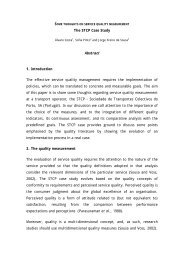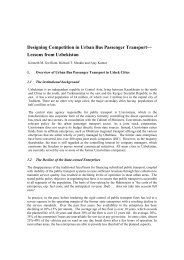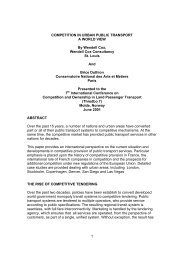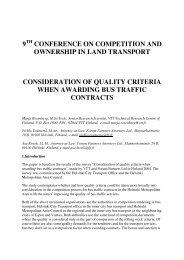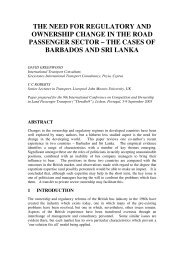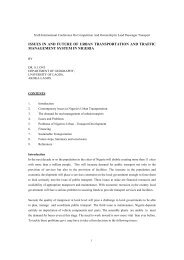Passenger Land Transport in Portugal: Improving Competition by ...
Passenger Land Transport in Portugal: Improving Competition by ...
Passenger Land Transport in Portugal: Improving Competition by ...
You also want an ePaper? Increase the reach of your titles
YUMPU automatically turns print PDFs into web optimized ePapers that Google loves.
Draft Paper, 14.06.2005<br />
Public service contract means a contract entered <strong>in</strong>to <strong>by</strong> the competent authorities of a<br />
MS and a transport undertak<strong>in</strong>g with the view of provid<strong>in</strong>g the public the adequate<br />
transport services.<br />
A public service contract may cover:<br />
- <strong>Transport</strong> services satisfy<strong>in</strong>g fixed standards of cont<strong>in</strong>uity, regularity, capacity and<br />
quality;<br />
- Additional transport services;<br />
- <strong>Transport</strong> services at specified rates and subject to specific conditions, <strong>in</strong> particular<br />
for certa<strong>in</strong> categories of passengers or for certa<strong>in</strong> routes;<br />
- Adaptation of services to actual requirements.<br />
Council Regulation 1191/69, as amended <strong>by</strong> Regulation 1893/91 has been the subject<br />
of a prelim<strong>in</strong>ary rul<strong>in</strong>g <strong>by</strong> the European Court of Justice ("ECJ") of September 17,1998.<br />
The Court ruled that although Article 4 of the Regulation 1191/69 allows transport<br />
undertak<strong>in</strong>gs, which are subject to a public service obligation to apply for the<br />
term<strong>in</strong>ation of such obligation <strong>in</strong> whole, or <strong>in</strong> part, MS have discretion whether or not to<br />
grant such a request. This is so even if the applicant demonstrates that a public service<br />
obligation entails economic disadvantages. However, MS have to respect the rules of<br />
Articles 3, 6(2) and 7 of the Regulation 1191/69. This implies that a refusal can only be<br />
based on the necessity of ma<strong>in</strong>ta<strong>in</strong><strong>in</strong>g the provision of adequate transport services.<br />
Accord<strong>in</strong>g to Article 3(2) this shall be assessed hav<strong>in</strong>g regard to:<br />
- the public <strong>in</strong>terest;<br />
- the possibility of hav<strong>in</strong>g recourse to other forms of transport and the ability<br />
of such forms to meet the transport needs under consideration;<br />
- the transport rates and the conditions which can be quoted to users.<br />
Council Regulation 1192/69 6 lays down common rules for the normalisation of<br />
accounts of railways undertak<strong>in</strong>gs. The imposition of f<strong>in</strong>ancial burdens on railways may<br />
cause distortion of competition vis-a-vis other modes of transport and also because of<br />
different national rules between railways <strong>in</strong>ter se. Elim<strong>in</strong>ation may take place:<br />
- <strong>by</strong> term<strong>in</strong>ation of certa<strong>in</strong> classes of f<strong>in</strong>ancial burdens;<br />
6<br />
Regulation (EEC) no. 1192/69 of the Council, of 26 June 1969, on common rules for the normalisation<br />
of the accounts of railway undertak<strong>in</strong>gs.<br />
10



